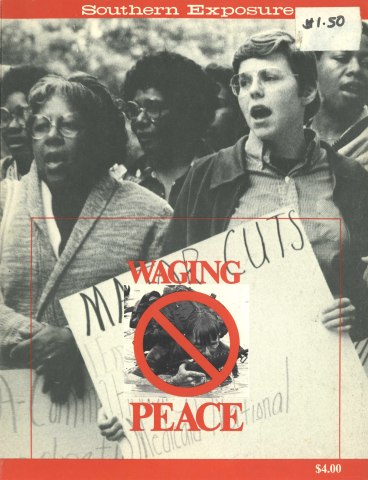
This article originally appeared in Southern Exposure Vol. 10 No. 6, "Waging Peace." Find more from that issue here.
In 1973, Southern Exposure published Volume I, Number 1, "The Military and the South." That issue grew out of two parallel movements, the civil-rights and the anti-war movements, which when they joined forces, rocked the foundations of American society. While the Vietnamese resisted the supposedly irresistible American military, people in the South and the U.S. stood up to say they were tired of being sent off to die, tired of being told that the costs of a war in Asia came before the needs of people in the United States.
The war in Southeast Asia ended in 1975, but our nation's resources did not get redirected toward overcoming economic and social inequities on the home front. In fact, under Nixon, Ford and Carter, the government drifted away from even the level of progress that had occurred during the war-burdened '60s. Despite its apparent rout in the wake of Watergate, the right gained ground with unprecedented rapidity. Progressive groups, forced onto the defensive, found themselves struggling to hold fast on hundreds of separate fronts.
The rise of the right, funded by corporate wealth, reached its peak with the coronation of Ronald Reagan in 1980, at which time the drift in American society away from justice became an explicit and forced death march. The policies of our current government have one end product in common: death. Its military policies — including direct interventions, military aid to repressive governments, sales of armaments by the government and corporations — kill people directly. The domestic policies kill people by taking away food, housing, health, jobs. U.S. foreign policy kills people throughout the world the same way it does at home: by taking away the means of life.
With all pretense of justice or fairness removed, the recent federal budgets — the money that pays for the policies — are stimulating the same outcry and resistance which helped end the Vietnam War. People of all races, all ages, all nations are building a movement that says no to death and yes to life.
With "Waging Peace" we hope to contribute to the struggle to recall and reforge traditional Southern progressive alliances. The articles here present the barriers to ending the militaristic move towards death, admitting the breadth, depth and the complexity of those barriers. We also present people striving for a solution; their stories provide models, resources and inspiration for continuing and building our movement.
The seeds of a new force for life exist: in unemployment and food stamp lines, in congregations of every religion, in union halls and overcrowded classrooms, in deteriorating public housing and in closed libraries. With "Waging Peace" we intend to help build links between the committed members of the traditional peace groups and people from this much wider range of constituencies, including people from civil-rights, women's, religious, neighborhood and workers' organizations. Through a self-conscious process of cooperation, the advocates of international peace can build the organizations and thinking that can defeat those who are taking our communities and our nation down the path to the last war.
Tags
Marc Miller
Marc Miller was a staff member of the Institute for Southern Studies and Southern Exposure for eight years. He is now a senior editor of Technology Review magazine. (1986)
Marc Miller is associate editor of Southern Exposure. He edited Working Lives: The Southern Exposure History of Labor in the South, published by Pantheon Books in 1981. (1980)
Marc Miller is an historian on the staff of the Institute for Southern Studies. He is currently editing a book of first person accounts of work in the twentieth century. (1978)

